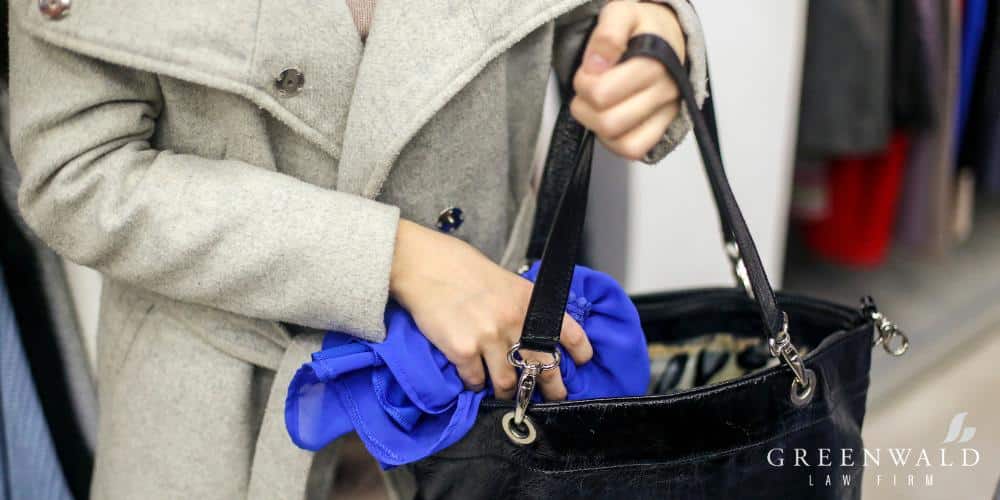Just because you make it out of the store without getting caught doesn’t mean you’re in the clear entirely. It is definitely possible to be arrested for shoplifting after you left the store without getting caught.
If you’ve been accused, charged, or arrested for shoplifting, Shreveport attorney Joseph Greenwald advises you to contact him for a free consultation as soon as possible. As an experienced criminal defense attorney, he understands how to prepare and defend shoplifting charges as well as all other types of theft crimes.
What is Shoplifting?
Shoplifting is when someone takes a piece of merchandise from a store without purchasing it. Shoplifting can occur in any retail business, store, or establishment with merchandise for sale. According to Louisiana state law, shoplifting involves any of the following:
- Removing an item for sale or on display without paying for it
- Stealing merchandise
- Returning an item to a retailer who did not sell you the item and trying to get store credit or cash
- Removing or changing a price tag in order to pay less than whatever the marked price is
Many establishments post surveillance cameras both inside and outside their storefront in order to capture footage of potential shoplifters. This means that just because you left the store without being caught does not mean you’re safe. In the event the store has footage of you shoplifting and you are identified in that footage, you could be charged after the fact so long as they bring the charges within the appropriate statute of limitations.
However, in some circumstances, the store might decide it’s not worth pursuing a case against you. That might be because the merchandise stolen was not worth a lot of money. It is up to the sole discretion of the store from which you stole the merchandise whether or not they choose to press charges and prosecute shoplifting.
Regardless, you should avoid going back to the store after shoplifting without getting caught. You never know if the same employee that was working when you were shoplifting might be there and recognize you and choose to make police contact this time around. In addition, there’s always the chance that they could put up your photos within the store if they have footage of you stealing on their security cameras.
It is also important to keep in mind that many shops share information about shoplifters with other businesses. The store where you shoplifted might do the same.
What Do I Do If the Store or Police Contact Me About Shoplifting?
Just because you were not arrested at the store, does not mean you won’t be charged or that an arrest warrant won’t be served against you. It may take weeks or even months for the store owner to file charges against you.
When they are ready to file charges, the store will present their evidence to the local police department. Next, the police will refer the case to a prosecutor. That prosecutor will work with the court to issue you a citation, summons, or complaint in instances of petty theft charges such as shoplifting. If it was a case of felony theft, however, you might receive an arrest warrant.
In any case, you should speak with a Shreveport criminal defense attorney at Greenwald Law Firm immediately. All of the next steps you take after shoplifting will be important. If you fail to appear in court on time, you might receive a bench warrant. This might lead to your arrest and further complicate your case.
Law enforcement officials will often offer plea deals in an attempt to get someone to admit guilt. Plea deals aren’t always a bad idea, but you should never simply accept the first offer you get. Again, always speak with an experienced criminal defense attorney first.
How Long Do the Police Have Before I Can Be Charged for Shoplifting?
Each criminal offense has a corresponding statute of limitations. A statute of limitations is the amount of time a prosecutor has to file charges against someone they believe has committed a crime. Usually, the clock starts as soon as the crime is committed or discovered.
The statute of limitations for theft crimes in Louisiana are no different. However, there may be some instances where the crime took a while to actually discover. In this case, the general statute of limitations may be delayed or extended. As such, te statute of limitations for shoplifting charges starts on the date the theft was discovered, not on the day it was committed. In Louisiana, the range for shoplifting is anywhere from 2 to 6 years.
After discovering that the theft occurred, the statute of limitations for shoplifting depend on the value of the goods stolen and whether or not the perpetrator had previous criminal charges of retail theft. Here are the general sentencing guidelines for different degrees of theft crimes:
- Misdemeanor theft (less than $1,000 in value)
- 2 years
- Felony theft (theft involving items worth between $1,000 and $25,000)
- 4 years
- Felony theft (more than $25,000 in value)
- 6 years
- Armed robbery, first-degree robbery, and carjacking
- 6 years
In some cases, it might take weeks or even months for the store to file charges against the convicted shoplifter. This may be due to a number of factors, such as constraints of video footage. If the store caught you on camera, or a security guard saw you, it might take a while for the store to get a positive ID. In the event that the store does identify you, they will sometimes check for other instances of shoplifting. Next, they will go through their archives with facial recognition software to see if you were in the store and stealing merchandise on other occasions.

What Are the Penalties for Shoplifting?
The penalties for a shoplifting conviction depend on a few different factors, including the value of the merchandise stolen, the age of the defendant, whether there are any prior criminal convictions, and the ability of the defendant’s criminal defense attorney to obtain the best deal.
Keep in mind that shoplifting is an enhanceable offense in Louisiana. This means that if you have previous shoplifting charges on your criminal record, your conviction this time around will be harsher. You could also face steeper fines. This is regardless of the value of the stolen goods. Jail time, fines, and probation are all possible.
While the penalties ultimately depend on your specific circumstances, there are guidelines set in place that offer the average sentence for things like shoplifting charges, petty theft, and more severe theft crime. These are the guidelines set by the state of Louisiana:
- Value of stolen goods less than $1,000
- Possible sentence of imprisonment for up to 6 months, fine of up to $1,000, or both
- Value of stolen goods between $1,000 and $5,000
- Sentence of up to 5 years imprisonment, a fine of up to $3,000, or both
- Value of stolen goods between $5,000 and $25,000
- Sentence of up to 10 years imprisonment, fine up to $10,000, or both
- Value of $25,000 or more
- Sentence of up to 20 years imprisonment, a fine of up to $50,000, or both
It’s important to know that these sentences and dollar amounts are only guidelines for sentencing. With an experienced criminal law attorney at Greenwald Law Firm, you may be able to negotiate a lower classification and therefore, a less severe punishment. However, sometimes a lower penalty or classification won’t be possible, but a good criminal defense lawyer should at the very least be able to work with the prosecution and judge to lessen your sentence.
Civil Court
Stores are also able to sue shoplifters in civil court for damages. In civil court, a person or entity sues another person or entity because of a dispute or problem between them. If someone loses a case in civil court for shoplifting, that person may receive a civil penalty and be ordered to pay back the value of the stolen goods or otherwise return the stolen property. However, civil court is different than a criminal case, so the defendant would not go to jail or receive other criminal penalties for losing the case.
How Long Could my Shoplifting Conviction Stay on my Record?
Having a criminal record could negatively impact several areas of your life. It could affect your voting rights, gun rights, current or future job prospects, housing eligibility, credit score, and more.
In Louisiana, it might be possible to expunge your record. This means you can have the record erased or sealed. You may expunge one misdemeanor conviction every five years (excluding DUIs). Felony convictions may only be expunged once every 15 years.
If you were arrested but not convicted of shoplifting, you may also apply for expungement. You must meet one or more of these conditions:
- The statute of limitations passed before charges were brought
- You were acquitted of the charges
- The charges were dismissed
- The district attorney decided not to prosecute
- The court granted a motion to stop the charges
Many types of shoplifting charges are eligible for expungement. The experienced Louisiana criminal defense attorneys at the Greenwald Law Firm can guide you through the process of applying for expungement.

Contact Shoplifting Defense Attorney Joseph Greenwald Today
Whether the offense is a felony or a misdemeanor, you must take any case involving a theft charge very seriously. Although you made a mistake by shoplifting, you don’t have to make a second one by not hiring a lawyer. The Greenwald Law Firm can help you build a strong case to protect your rights and potentially reduce the charges against you. To speak with experienced Shreveport shoplifting defense attorney Joey Greenwald, call 318-219-7867 or complete our online intake form today.


